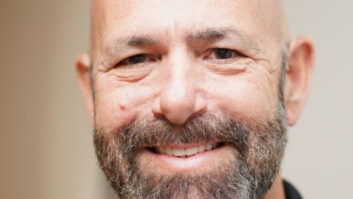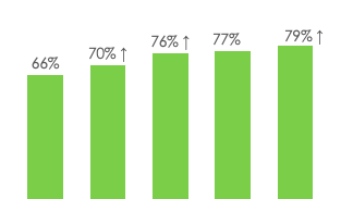If attendance at the Nationwide Marketing Group’s PrimeTime! show is an illustration of its business, the buying group had a healthy first half.
The annual summer show, held at the Mandalay Bay Resort here last month, had 250,000 square feet of exhibitor space from 200 vendors and was expected to draw around 3,600 or so attendees in total.
“This is our largest show in member and vendor attendees combined,” said Robert Weisner, executive VP of Nationwide.
The group, which has 2,800 members representing 8,000 storefronts and $6.5 billion in majap sales, $2.3 billion in CE sales and $2.2 billion in furniture sales annually, has not been immune to the economic slowdown of 2008, but the group has seen some overall growth during the first half.
In a group interview with TWICE at the show, Weisner, Nationwide president Ed Kelly, executive VP Les Kirk and marketing electronics VP Michael Decker outlined the challenges and successes the group has had this year and what may be coming up in the fall.
“There have been some areas of the country where business has been soft,” said Kelly, “but overall our members are saying their business is running up or running even.”
Weisner said the typical Nationwide member “carries electronics, appliances and furniture. If one [category] is soft, the other one or two balances out.”
Kelly noted that members took Nationwide’s advice from last year and prepared for a slowdown. As Kelly said, “For instance, we forecasted that furniture would be down, so we told our members to ‘sharpen their tools’ and make [cost-cutting] decisions in their businesses.”
Kirk said that during February and March Nationwide’s membership cut down on purchases and worked off of inventory, but by June and July orders and sales were up in CE and major appliances.
Electronics, specifically HDTV sales, have been a bright spot for the group, according to Decker. “A lot of our members have transformed their businesses due to flat-panel TV sales. They now do install, home wiring, networking. They are custom installers now. That is greater profitability for us.”
Decker added that there are plenty of opportunities out there, such as in the converter-box program. Weisner noted that even at this late date, “plenty of consumers don’t know enough about HDTV and the transition. They are doing a lot of research online, visiting stores and finding out that flat panels are now no longer $4,000, but $1,000 or less, and our members can give advice about the best ones for their needs.”
He said the bottom line is “the [February] 2009 digital TV deadline provides a lot of additional interest to consumers. Our members are in a great position to take advantage of that.”
Kelly did remind everyone that the potential of HDTV is still a major one beyond this year because “HDTV is still more expensive than analog TVs and in the next five years we will still replace half of the 300 million analog sets in the U.S.”
In major appliances there have been some bright spots. For example, the front-load laundry business, due to technology and styling, has sold well, Weisner said. Kirk noted that the “freezer category is the best out there,” with many families looking for more energy-efficient units and larger ones so they can store food bought on sale, another commodity whose prices have been on the rise.
However, Nationwide reported ranges and built-in ovens have been off, along with dishwashers, mainly due to slower housing starts.
When asked about the pending sale of GE Appliances and how that might affect Nationwide, independent retailers of all stripes and the major appliance business as a whole, Kelly said GE management at the show indicated it could very well be “a spin-off with its current management, which would be good news. If that is the case, it would be very favorable.”
Kirk added, “That’s the best thing that could happen.” In a briefing with Nationwide, GE Appliance managers said if it was a spin-off or some arrangement with current management in place, “it would have its own ability to get proper financing and expand. They said that when [appliances] had lower returns they had to fight for capital.”
Odds are a decision could be made in 90 to 120 days, Nationwide executives were told, but that range is not set in stone.
In looking at the first half and what the fall season may hold, Weisner harkened back to previous economic slowdowns and what happened then is, in part, happening now. “When airline tickets go up, gas for vacations go up, consumers will stay home. But they will fix up the kitchen, and will spend money on the entertainment room. They don’t want to be completely deprived … of nice things and spend money on their homes.”
So far, with a membership of retailers of various sizes with a diversified lineup of electronics, appliances and furniture, among other categories, Nationwide seems to be holding its own during a turbulent 2008.













